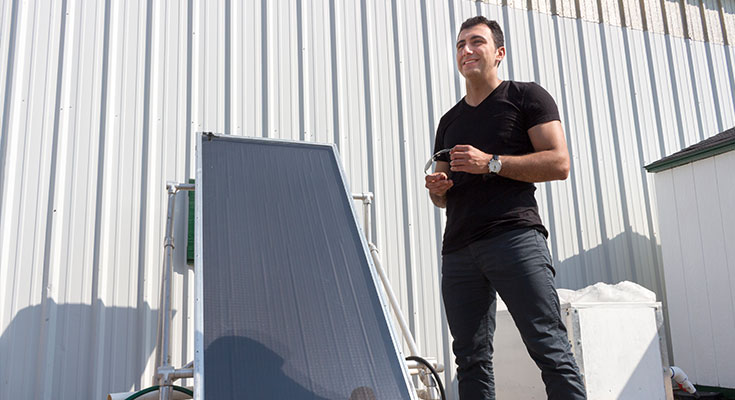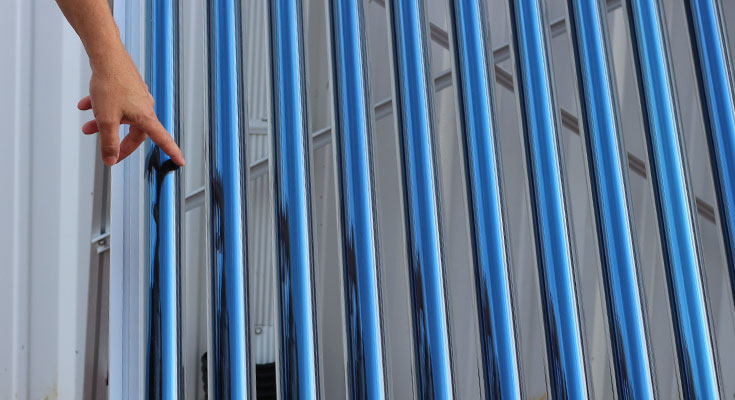MSU PhD student pilots solar energy study
With an average of only 174 sunny days every year and many months of cold weather, East Lansing, Michigan may seem like an unlikely hub for solar energy research. However, MSU's commitment to sustainability is driving university researchers to uncover clean energy solutions, no matter the difficulty.

Sina Jahangiri, PhD candidate and solar water heater researcher from MSU's Department of Mechanical Engineering, posing near a flat plate collector system for solar water heating.
"We're testing the effectiveness of solar water heaters in Michigan's climate, specifically on MSU's campus," said PhD candidate Sina Jahangiri, solar water heater researcher from MSU's Department of Mechanical Engineering, "as water accounts for a substantial portion of energy use at many residential, commercial and institutional buildings, the project has an opportunity not only to reduce environmental footprint, but also to lower energy cost."

Situated at MSU's Turfgrass Research Facility, the solar water heater project is contrasting two solar water heating systems. The first is a flat plate collector, which is less expensive and easy to assemble, but has lower efficiency on cloudy days and is more susceptible to freezing in cold temperatures. The second is an evacuated tube collector, which is pricier, but more efficient in cloudy weather and colder temperatures. Jahangiri's research team is hopeful that the study will reveal which system is practical for MSU's campus in order to inform potential future installations.

Evacuated tube collector system for solar water heating.
Because MSU boasts impressive research facilities that reach miles beyond the core of campus, using solar water heaters can prove a more efficient system for the smaller, non-traditional buildings usually found on these sites. Jahangiri also notes that using solar water heaters at sites beyond main campus can improve their access to hot water and contribute to reduced electricity costs and fossil fuel use.
While the research has already revealed important benefits, a testy climate wasn't the only obstacle facing Jahangiri's team during the early stages of development. "We faced time-constraint challenges, financial questions and other administrative barriers," said Jahangiri, "without the collaboration of different departments, this project would not have been possible. Thankfully, each department worked together to bring the research to life."
One key element of that collaboration: MSU's Sustainability department. "In addition to initially funding the project through their fellows program, Sustainability provided close connections to other departments, helping us gain access to different buildings and people," said Jahangiri. Considering the installation of the solar water heaters involved MSU's Biosystems and Agricultural Engineering department, Infrastructure Planning and Facilities, Land Management and Purchasing departments, getting Jahangiri in contact with the right people was a critical role in the project.
Once installed, the systems required daily measurements, allowing Jahangiri to bring several students on board. "Although students spend long hours doing experiments in lab courses, projects like this help them see how concepts from their coursework can be utilized in real world problems," said Jahangiri.
For MSU mechanical engineering senior, Sean Raymor, the experience was a great addition to traditional classwork. "I primarily took measurements of the two systems, but that hands on experience was really unique," said Raymor, "instead of a traditional elective to finish out my program, I got to physically test the technology and identify trends from the data."
Jahangiri plans to continue the research through the winter, to really test the systems in Michigan's harsher conditions. Once completed, his team hopes to provide the university with data that can help determine if solar water heaters can be applied anywhere else. By continuing to work in collaboration with various MSU identities, he is optimistic that his research can have real, operational benefits to the university and contribute to a greener campus.

